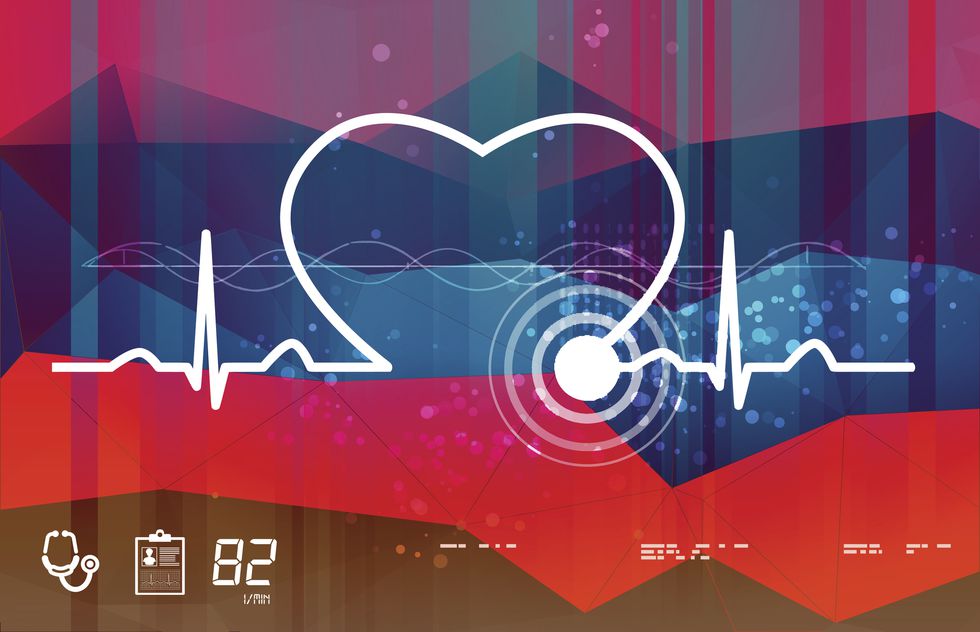Sure, you get your blood pressure taken every time you go to the gyno—but barring the nurse gasping in horror, would you really know if your BP was crazy-high? What is considered high blood pressure, anyway?
Not to freak you out, but high blood pressure, or hypertension, is actually super-common: about one in three U.S. adults have it, according to the Centers for Disease Control and Prevention.
While it’s tempting to zone out at the doctor’s office (like, you know, during the weigh in), your BP reading definitely qualifies as one of those things you really shouldn’t ignore.
WHAT IS CONSIDERED HIGH BLOOD PRESSURE?
The condition is pretty much exactly what it sounds like: “Basically, high blood pressure is when the pressure in your blood vessels is higher than it should be,” Shanna Levine, M.D., an internist at Mount Sinai hospital in New York City, tells Women’s Health. “We have different ways of categorizing this, but once it gets above a certain level, we call it hypertension.”
Your blood pressure is measured using two numbers: systolic pressure (the amount of pressure exerted by your heart pumping blood into the arteries and throughout the body) over diastolic pressure (how much pressure your blood is exerting against artery walls during the rest between heartbeats), according to the American Heart Association (AHA).
If your number is below 120/80, you’re in the clear; pre-hypertension begins when blood pressure rises to 120 to 129 over less than 80. Stage 1 hypertension is 130 to 139 over 80 to 89; stage 2 hypertension is 140 or higher over 90 or higher; and a hypertensive crisis occurs when systolic pressure tops 180 and diastolic pressure rises about 120, according to the AHA.

COMPLICATIONS OF HIGH BLOOD PRESSURE (A.K.A. WHY YOU SHOULD CARE)
High blood pressure is a straight-up killer.
“It leads to two common conditions that actually are the number-one reasons that American people die,” Levine says. “It leads to heart disease and stroke, so a well-controlled blood pressure is the most important thing you can do to prevent dying of heart disease and stroke.”
Blood exerts pressure on arterial, vein, and capillary walls, and when it’s consistently too high, those walls get damaged. That, in turn, narrows blood vessels, making it harder for the heart to do its job.
“If you have hypertension for long enough,” she adds, “you start to get what we call end organ damage where certain parts of your body start to shut down.” If left unchecked, Levine explains, consistent lack of oxygen can translate to problems in your your kidneys, in addition to your heart and brain.
According to the American Heart Association, as many as half of all Americans have high enough blood pressure that they’re at risk for serious health complications.
SIGNS OF HIGH BLOOD PRESSURE
To be clear: Most people have ZERO CLUE they’ve got high blood pressure.
But some people will find themselves feeling kind of crappy. Levine says hypertension might be heralded by headaches, nausea, chest pressure, and just a general ill feeling. Other symptoms of high blood pressure might include:
Your parents have high blood pressure
You’ve got brain fog
You’re bloated and constipated
Your vision is worse
You’re dizzy
HOW TO PREVENT HIGH BLOOD PRESSURE
Basically, you’ve got to stop being so extra.
Excessive alcohol consumption, smoking, and inactivity all elevate a person’s likelihood for developing hypertension, so Levine recommends two-and-a-half hours of moderately intense movement each week. Women, she adds, should aim to limit alcohol consumption to one drink per day.
High blood pressure can also be reversed with medication, she says, although there are definite steps people can take before it comes to that.
Eating less junk can also help—start upping your servings of fruits and veggies and cutting back on processed foods. “Look at the sodium that’s on the package,” she advises. “It’s not the salt we put on food, but the sodium that’s hidden in your food” that creates problems.
To bring high blood pressure back to an acceptable level, many doctors recommend the DASH diet (DASH stands for “Dietary Approaches To Stop Hypertension). The plan advocates for the consumption of whole grains; fruits; vegetables; low- or non-fat dairy; lean meats and fish; nuts, seeds , and legumes; and fats and sweets, in descending order.
Ultimately, it’s a good idea to go see your doctor—not necessarily every year, Levine says, but every couple of years. And in the interim, check your blood pressure so you know your number.
“The sooner you know you have [hypertension],” Levine says, “the sooner you can start reversing your blood pressure. ”












